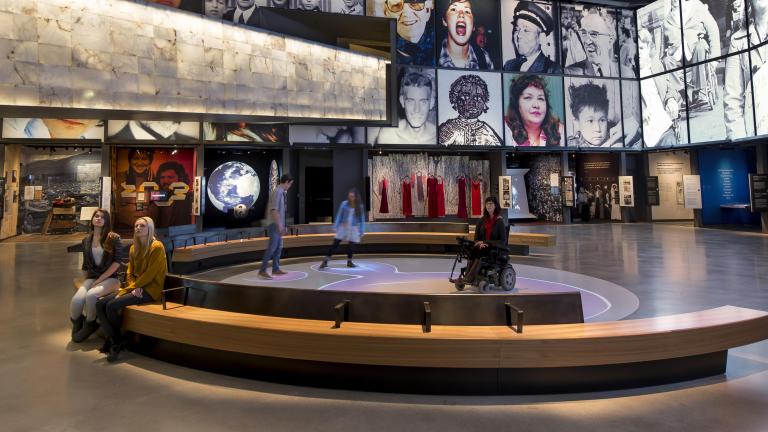This release is more than two years old
This release is more than two years old. For additional information, please contact Amanda Gaudes from our Media Relations team.
News release details
The Canadian Museum for Human Rights (CMHR) will re‐open its doors to onsite visitors on Wednesday, June 17, offering Manitobans a safe, accessible and uplifting experience after a long period of social isolation.
“This is a large, beautiful and airy building full of sunlight and open, accessible spaces,” CMHR president and CEO John Young said. “It contains many hopeful stories about the importance of human rights and the resilience of the human spirit. Studies have shown that arts and culture are important for mental well‐being, with the power to heal and inspire.”
Frontline workers and their families will be offered complimentary admission every Friday until the end of summer by reserving free tickets online through the Museum’s new #FrontlineFridays offer. “We want to show appreciation to people in our community who’ve been out there doing their jobs during the pandemic – from health care workers and grocery store employees to taxi drivers, delivery people, utility workers and many others,” Young said.
After careful planning to ensure the safety of staff and visitors, the Museum and its Boutique will open five days a week, Tuesday to Saturday, from 10 a.m. to 5 p.m. A new, online timed‐entry ticketing system has been introduced as a way to help ensure social distancing, enabling visitors to select one of three two‐hour time slots to begin their visit.
High‐touch features like touch screens and hands‐on interactive features will not be available. The Israel Asper Tower of Hope will be closed. Tours will be self‐guided and available through the Museum’s mobile app. ERA Bistro will be closed. General admission rates have been reduced to $12 for adults, $10 for students and seniors, and $5 for youth (free as usual for children six and under). More information is available online.
“Most exhibits remain open and there will still be much to explore,” said Young. “Visitors can learn the story of Viola Desmond, who is now featured on Canada’s $10 bill. They can see the world’s largest beaded Métis firebag and walk on glowing, alabaster ramps. They can immerse themselves in a 360‐degree surround film about Indigenous worldviews or point at two‐metre standing ‘books’ to activate video stories about taking action for human rights.”
The CMHR will be the first national museum to re‐open since March 14, reflecting relatively lower numbers of active cases in Manitoba.
Young said the Museum is opening under a three‐pronged approach, respecting people who have different comfort levels during the ongoing COVID‐19 pandemic. The first approach is to re‐open the building, taking steps to meet or exceed health and safety directives. As a 24,000-square-metre facility with seven gallery levels, the CMHR is well positioned to effectively implement social distancing. Already rigorous cleaning and sanitation processes will be enhanced. Visitors and staff will be asked to complete Manitoba's COVID‐19 online screening tool before arrival.
The second approach is to continue offering rich online experiences for people who prefer virtual visits – including a new collaboration with the Winnipeg Symphony Orchestra for exclusive online broadcasts of small group performances recorded in the Museum. Other online experiences include virtual tours, films, online exhibits, educational resources for at‐home learning and opportunities to share stories.
The third approach will welcome visitors outside to a new temporary exhibition called ARTiculate Our Rights that opens July 15, featuring art by Manitoba youth about the future of human rights. The exhibition includes 26 artworks displayed on 13 large installations throughout The Forks, a gathering place where the Red and Assiniboine rivers meet, located adjacent to the Museum.
The Canadian Museum for Human Rights is the first museum in the world solely dedicated to the evolution, celebration and future of human rights. Using multimedia technology and other innovative approaches, the Museum creates inspiring encounters with human rights for all ages, in a visitor experience unlike any other.
-30‐
This release is more than two years old
This release is more than two years old. For additional information, please contact Amanda Gaudes from our Media Relations team.
